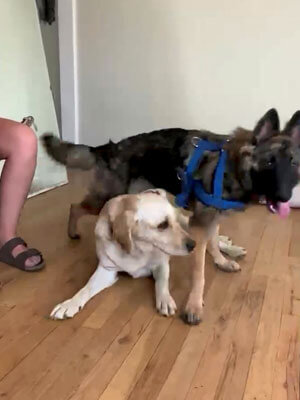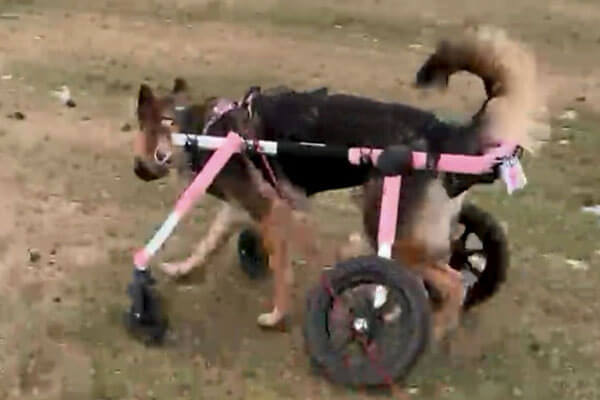Poppie, the German shepherd/Chow Chow mix was scheduled to be euthanized by a California shelter after being surrendered to the shelter for the final time. However, Diane Ewert quickly came to her rescue, adopting her in the eleventh hour.
Poppie was born with a condition known as Cerebellar Hypoplasia (CH). This resulted in her cerebellum being underdeveloped, which severely impacts her mobility. This disability is also the reason for the shelter’s decision to have her put down, as a disabled dog is much more difficult to adopt out.
Cerebellar Hypoplasia heavily affects her balance, coordination, and motor skills, meaning she had a very hard time walking properly due to her condition. However, the key factor here is that this disability does not cause her any pain or suffering.
Sadly, due to her disability, Poppie has been repeatedly surrendered to various shelters throughout her life after each adoptive family decided they did not have to means or confidence to continue her care. Furthermore, veterinary care can become very expensive very quickly, and specialist equipment and physiotherapy are often required for a condition such as this.

Diane Ewert, who is connected with a local dog rescue in Kingsburg, California, heard about Poppie’s case and immediately decided to take action. A friend had informed her of Poppie’s imminent euthanasia, in response to which Ewert headed straight to the shelter where Poppie was being kept. She was fortunate enough to arrive within an hour of Poppie’s allotted time slot.
“I received a message on Facebook from a high school friend of mine,” explained Ewert to SWNS. “[she was] letting me know that Poppie was about to be euthanized at the shelter.”
Ewert described how her friend had reached out to her to explain what was happening. She was then fortunate enough to be able to contact the rescue she works with and have them tag Poppie so that she couldn’t be euthanized. By tagging the young pup the rescue was signaling that they would take responsibility for her.
Upon arriving to collect Poppie from the shelter Ewert was greeted by Poppie bursting through the doors in excitement. Ewert had never met the disabled pup before this day, and their very first meeting was marked by Poppie “wobbling through the doors”. “I soon discovered how reactive she was. She sounded extremely aggressive.” Ewert described.
Ewert eventually took Poppie home to meet with the other dogs in her doggie foster household. She had been nervous about the meeting, to begin with, however, she quickly realized that Poppie had simply been “misunderstood”.
“Everybody labeled her as aggressive but, she just wanted to be loved and just wanted to be near the thing that she was being so reactive to. This was a huge relief to me.” Ewert explained.
Ewert worked extremely hard to find a forever home for Poppie that would be willing to care for her, Cerebellar Hypoplasia and all. Fortunately, she found just such a home with Christina Powell, from Alberta, Canada, and her fiancé Garret.
Ewert had set up a Gmail account for Poppie, and nervously awaited news of a family willing to take her on. Fortunately, she didn’t have to wait too long as Christina and Garret quickly got in touch to show their enthusiasm for adopting the wobbly-legged canine. Ewert describes to SWNS how the email had her in tears. It had been clear to her from the moment she read the first email that Poppie had found her perfect forever home, and so they quickly began the adoption process.

“I cannot believe how lucky I was to be a part of this journey for her. This is a foster story that I will never forget.” Ewert gushed.
Poppie was renamed by her new family to Timber. Timber now had a new doggy sibling that goes by the name of Kona. She has also had a customer wheelchair made for her which helps her to maintain her balance far better than before, making walking a much smoother and easier affair.
“Timber is an absolute ray of sunshine.” Powell, her new owner, described. “She approaches every task with a ‘can-do’ mentality, and if something does not go the way she planned, she brushes it off and finds another way.”
According to Powell, the newly-named Timber, acts just like a neurotypical dog. She does not require any kind of medication for her disability, nor does she need constant veterinary care.
“Our goal is to provide education and advocacy so that more dogs like Timber find forever families,” Powell added.

